University Council Open Forum
Section IV.3(c) of the Council bylaws provides that a University Council meeting “shall incorporate an open forum to which all members of the University community are invited and during which any member of the University community can direct questions to the Council.”
All members of the University community are invited to bring issues for discussion to the:
University Council Open Forum
Wednesday, December 4, 2019 at 4:40 p.m.
Bodek Lounge, Houston Hall
Individuals who want to be assured of speaking at Open Forum must inform the Office of the University Secretary (ucouncil@pobox.upenn.edu) by 10 a.m. on Monday, November 18, 2019. Please indicate the topic you would like to discuss.
Those who have not so informed the Office of the University Secretary will be permitted to speak only at the discretion of the moderator of University Council and in the event that time remains after the scheduled speakers.
Please see the format given below. Questions may be directed to the Office of the University Secretary at (215) 898-7005 or ucouncil@pobox.upenn.edu
—Office of the University Secretary
Format for University Council’s Open Forum
December 4, 2019
The University Council will devote a substantial portion of its December 4, 2019, meeting to a public forum. The purpose of the Open Forum is to inform Council of issues important to the University’s general welfare and of the range of views held by members of the University. The forum is open to all members of the University community under the conditions set by the bylaws, following guidelines established by the Steering Committee of University Council:
- Any member of the University community who wishes to do so may attend the Council meeting. Individuals who want to be assured of speaking at Council, however, must inform the Office of the University Secretary (ucouncil@pobox.upenn.edu) by 10 a.m. on Monday, November 18, 2019, indicating briefly the subject of their remarks. Those who have not so informed the Office of the University Secretary will be permitted to speak only at the discretion of the moderator of University Council and in the event that time remains after the scheduled speakers.
- Speakers should expect to be limited to three minutes with the possibility of additional time in cases where members of Council engage the speakers with follow-up questions or remarks. The moderator may restrict repetition of views.
- Following the deadline for speakers to sign up with the Office of the University Secretary, the chair of the Steering Committee and the moderator of University Council will structure the subject matter themes, speakers and times for the Open Forum session. In the event that there is not enough time available at the meeting to provide for all those who have requested to speak, the two officers may make selections which accommodate the broadest array of issues having important implications for Council’s work and represent the breadth of Council’s constituencies. The resulting order of Open Forum topics will be made available no later than the Tuesday before the meeting, to be published on the Office of the University Secretary website (https://secretary.upenn.edu/univ-council/open-forum) and, if deadline constraints allow, in Almanac.
- Speakers’ statements should be framed to present policy issues and be directed to University Council as a body through the moderator. The moderator will have discretion to interrupt statements that are directed against persons and otherwise to maintain the decorum of the meeting, as provided for in the bylaws. In cases where questions or positions can be appropriately addressed by members of Council, or where a colloquy would seem to be productive given the time constraints of the meeting, the moderator may recognize members of Council to respond to speakers’ statements, with opportunities for follow-up by the speakers.
- Should the number of submitted topics of community-wide interest exceed what can be accommodated during a single Open Forum session, discussion will be allowed to continue at the following University Council meeting.
Council: State of the University: Building Faculty Leadership
At the University Council meeting on October 23, the annual State of the University presentations were delivered. The Provost’s portion was introduced by Provost Wendell Pritchett and given by Vice Provost for Faculty Anita Allen, who talked about Building Faculty Leadership. Her portion is below. The President’s portion about the Climate Action and Sustainability Plan 3.0 was published last week (Almanac October 29, 2019).
Anita Allen: Thank you, Provost Pritchett and Dr. Gutmann. I am very pleased to work closely with Wendell Pritchett on reemphasizing and building our faculty development programs. We have at Penn an outstanding faculty of committed scholars, professional physicians, teachers and researchers; but they don’t just get that way by chance. We have to support their excellence through mentorship of younger faculty, and through providing our mid-career and senior faculty continuing opportunities to grow into well-rounded leaders. Our overarching goal is pretty clear, we want a great faculty for a great university. I note that one of our newest mentoring programs has been led by Professor Emily Steiner, who is on the podium today as UC Moderator. Dr. Steiner, along with her colleagues KC Tan from philosophy, and Heather Williams from English, created and led a program, supported by the Provost’s Office, called Humanities Network. This is a year-long program of mentoring for our faculty in the humanities in the School of Arts and Sciences. But, this kind of faculty-led and faculty-designed mentoring program is only one of the ways in which we work to develop a great faculty.
So, what is the overall strategy for building a faculty of successful scholars and also leaders? Well, we start by making sure that we always assess the trends and the needs of successful teachers, scholars and professionals. Then, we build upon that by fostering an understanding of our expectations, our common shared values and the resources that are available at the University of Pennsylvania. Then, we top that by providing ample mentoring opportunities for individuals and by building communities through partnerships with our 12 schools. Next, we support promotion, tenure and retention. We spend a lot of time on hiring great faculty, on retaining superb faculty and on making sure faculty who have succeeded in the expectations of their disciplines are promoted in a timely fashion. Finally, the last step is that we cultivate skilled, inclusive leadership. With these successive steps I believe we can and have been moving the faculty development agenda forward. There are, however, some important challenges that we face as we try to develop our faculty. One challenge is to acquire a very fine sense of who our faculty are in order to improve their capacity to succeed and to lead.
I have been committed, as vice provost for faculty, to trying to understand who we are as a faculty and the implications of our identities. We are a faculty that’s largely tenured, standing faculty, but the CE track, the Clinician Educator track, is catching up with the tenure track. The STEM faculty on campus far outnumber the non-STEM faculty on campus. The largest group of faculty are our full professors, with assistants and associates being lower in numbers. Thus, when you are trying to develop faculty at Penn, you’re trying to develop a faculty that is largely tenured, largely STEM and largely full professors. But we cannot neglect people who are not in those categories.
Over 54 percent of our faculty are in the medical school. So, if you take the STEM faculty in the medical school, combine that with the STEM faculty in engineering, and the STEM faculty in the School of Arts and Sciences, you get a good chunk of the faculty who are STEM. We are very much a faculty involved in biomedical research and the basic sciences. We have to reach people where they are. How do we connect with scientists, people who are STEM in their orientation, and move them along in their careers and also build leadership among those faculty? And how do we do the same for humanists and social scientists?
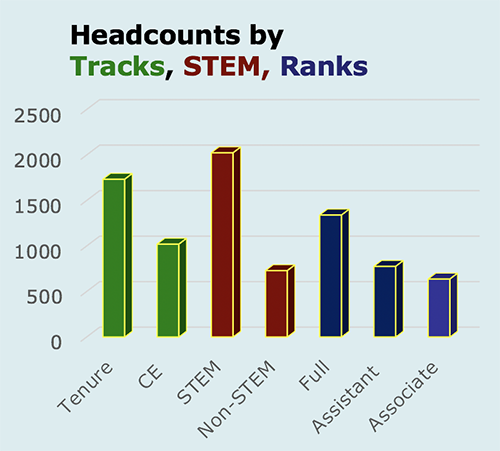
We have 12 schools and 92 departments that are working with us on issues around development and mentorship. The faculty is changing in ways which also must be taken into account. So, not only are we dealing with a faculty that has the characteristics I just mentioned, but we are also dealing with a faculty which since 2011 has 46 percent more Blacks, Hispanics and Native Americans. A strong 14 percent of our standing faculty are now over 65, and we have, since 2011, 34 percent more minority faculty overall, 22 percent more women and 15 percent more non-standing faculty. Plus, we have more faculty who are self-identified as LGBT. In thinking about how we advance this great, diverse faculty, we have to be realistic and knowledgeable about the significance of who we are. Assessing who we are proves to be critical.
So, how do we meet the challenges? We do so through strong leadership, starting with our president and provost, our most important guides; and our vice provosts, including Vice Provost Val Cade who is here at UC, and other top University leaders. We have 12 school deans who are partners, 92 departments chairs, 285 faculty vice deans and other faculty administrators, and three Faculty Senate tri-chairs. We have the Penn Forum for Women Faculty, the retired faculty (PASEF/ASEF), the University Council, and various cultural centers—all of them participate in efforts to reach all the faculty where they are and to build and grow all the faculty to become the best leaders, scholars and researchers they can possibly be. That’s what we are trying to do, that’s what we are largely succeeding in doing.
Let me say a little bit about some of the specific programs Penn boasts. They are far too numerous to list, I can give a quick overview. Some programs that are created by the University include: Penn Pathways, Humanities Network, and Penn Forum for Women Faculty. We have skills-focused workshops that my office facilitates, involving negotiations, mediation and op-ed writing. We have a SAS-based early career program that include the Humanities Network and an orientation program for all first- and second-year professors. The medical school has many programs including those that are a part of the advanced program: the Richards Society which is new for tenured-track medical school faculty, CE track faculty advancement initiatives that Lisa Bellini has been working on, the Edward Cooper Leadership Training Program, and FOCUS, which is an important and successful program for women leadership in medicine.
These are some of the ways in which we help early and mid-career faculty to achieve their highest goals. What about senior faculty? We offer the Provost Leadership Academy which I’ll tell you about in a few minutes; we have individualized coaching now—faculty members who are leaders can get coached by individual coaches. We work with Wharton in providing coaching opportunities for our faculty. We offer the Penn Fellows program, which you probably know a lot about—these are mid-career faculty nominated by their deans and selected by the Provost’s Office to undergo special leadership training. We have new department chair training and diversity/implicit bias training for our faculty at all stages. We facilitate external opportunities, for example, the ACE program, and we have for our senior faculty, PASEF and ASEF. These are just some of the offerings for our mid-career and senior faculty.
One of the biggest concerns when we think about building a diverse and inclusive faculty is providing faculty development programs that specifically target the problems of discrimination and implicit bias. What are our anti-discrimination and implicit bias programs? We have many of them—some of them are mandatory; some of them are not. We have for example, a mandatory training program for all members of school search committees; they must go through implicit bias training. We also have mandatory implicit bias training for our diversity search advisors. We have formal mentoring programs for junior faculty, and we host the Provost Leadership Academy, which includes modules on diversity and inclusion. Many departments and schools require implicit bias training not specifically mandated by the Provost’s Office.
Penn has a number of lecture series that are run through the schools and through the University that are focused on diversity. For example, just a couple of days ago, my office hosted a wonderful Provost’s Diversity lecture delivered by Professor Michael Jones-Correa, who talked about the problems of borders: How do we define borders? What do borders mean? It was a good opportunity for our Latinx faculty community to share with the University as a whole some of the research and outreach that they’ve done. Professor Fernando Chang-Muy was also on the program to complement Professor Jones-Correa. We have visiting diversity faculty and artists on campus who present diversity and inclusion related projects and programs. We’re launching a new Program of Provost Visiting Faculty Fellows, who will be visiting professors, coming to the University, who will contribute perspectives on diversity and inclusion. The first one will be Dr. George Yancy, a philosopher who will be visiting from Emory University. Some of you might know his work from his New York Times columns on issues around race and diversity and inclusion. We’re doing all of these things and are experiencing success. The efforts we’ve had to make the faculty more diverse as part of our faculty development initiatives have been quite successful. We can boast it at a time when the faculty as a whole has grown by nine percent and the female standing faculty has grown by 22 percent (over the period of 2011 to 2018). The minority standing faculty has grown by 34 percent, the URM standing faculty by 46 percent, the female CE faculty by 18 percent and the female minority standing faculty by 42 percent. Objectively by the numbers and by Climate Survey data, we’re doing well in trying to make our faculty more diverse and address issues around diversity, inclusion, equity and anti-bias.
Finally, one of the exciting initiatives we’ve undertaken to support our faculty leaders is to create something we call the Provost Leadership Academy. These are day-and-a-half retreats for our Penn Fellows and for our department chairs, faculty senior administrators. These members of our community gather for programs that are intended to help them grow as leaders. I want to say a little bit about the most recent faculty Leadership Academy which was held at the end of September, and the theme of it was Holistic Faculty Leadership. We are using this theme to address leadership that includes the whole person and that recognizes that being a faculty member and being a leader mean bringing all of your assets and resources to the community while also taking good care of yourself. The invited participants, again, were current Penn Fellows, our current department chairs and our current senior faculty administrators. We had programs that related to the things that make good leaders. Some of our faculty department chairs are hired from the outside of Penn in a national search for a department chair. They become department chairs to be professional department chairs. But some of our department chairs are essentially volunteers—people internal to Penn who are available, who will take the job for three or four years who may have no experience whatsoever dealing with budgets, difficult people or any of the other problems that go along with being a department chair. So we provide our department chairs, in these academies, with skills training. How do you manage people? How do you exercise your authority? How do you exercise your discretion? How do you build diverse teams? How do you manage your budgets and resources? How do you manage change? How do you manage time? How do you prioritize?
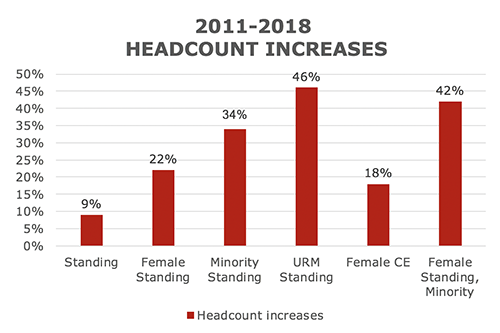
We offer in our Academy a varied curriculum that takes advantage of our own community’s faculty and staff talent for workshop facilitators, but we also bring in facilitators from the outside. In our most recent Academy, Penn Executive Vice President Craig Carnaroli, whom you heard from earlier, came and offered a course he called Penn 101, in which he described in great detail how Penn works. Many faculty leaders have never had the opportunity to hear from the University Executive Vice President about how the University operates. They learned a lot from Craig—he’s always a popular speaker at our events. We also had, from the outside this time, Professor Susan Fiske from Princeton University, who’s an expert on diversity and inclusion. We had a wonderful presentation by Dr. Jody Foster from PSOM, who talked about the work that led to her book, The Schmuck in My Office, which discusses how to effectively deal with difficult people at work. We held a very useful workshop by the renowned Professor Richard Shell from Wharton on negotiation. Negotiations are a very important part of being a leader—you have to know how to negotiate around policy issues but also around salaries and other resources as well.
My office tries to be very creative in how we offer content to our faculty. We do not want to just lecture at them; we want to offer opportunities to practice negotiation, to practice how they would deal with difficult people, to practice how they would exercise their discretion. We also want to show them, through, for example, art, how they can appreciate the fact that people see the world differently. Indeed, we held a whole workshop on Visual Strategies Training. An expert who was a former museum curator came in and showed us a painting to think about. She had everyone describe what they saw in the painting. She used a Picasso painting (one of the Harlequin paintings) as the discussion text. It was fascinating how differently people saw the painting. A favorite remark was made by an orthopedic surgeon who looked at a gentleman in the painting who was standing in what I would call, from ballet, second position, and said, “That guy has hip displacement!” The session was an innovative way to show, through art, that the world can look differently to different people and that being a good leader means you have to appreciate the fact that people do see the world differently and know how to handle and manage the fact that we are different and observe differently. The feedback on the Provost’s Leadership Academy has been positive; faculty report the workshops do provide a needed opportunity to reflect and to stand back from usual duties to learn things of value. Some of the memorable comments on the evaluations have included, “I thought I was an awful negotiator and I really was. Now I have an idea of what to do.” Dean Jackson graciously submitted to a probing interview by me at the opening night of the last Leadership Academy. Dean Jackson spoke frankly in response to my questions about his career (Dean Jackson is here today at UC.). The faculty enjoyed the interview. They thought it was great to hear from Dean Jackson who spoke with nuance and wisdom his career as an anthropologist and dean of two Penn schools; and someone remarked, “Anita Allen is our Oprah Winfrey.”
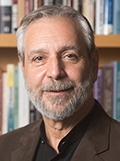
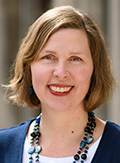 Michael X. Delli Carpini has been named the inaugural faculty director and Leah Seppanen Anderson the inaugural executive director of the University of Pennsylvania’s new Stavros Niarchos Foundation Paideia Program for Penn undergraduates. The announcement was made by Penn President Amy Gutmann and Provost Wendell Pritchett.
Michael X. Delli Carpini has been named the inaugural faculty director and Leah Seppanen Anderson the inaugural executive director of the University of Pennsylvania’s new Stavros Niarchos Foundation Paideia Program for Penn undergraduates. The announcement was made by Penn President Amy Gutmann and Provost Wendell Pritchett.
 An international team of experts led by researchers in the Perelman School of Medicine at the University of Pennsylvania and University of Glasgow has been awarded a $9.7 million, five-year grant from the National Institute of Neurological Disorders and Stroke (NINDS) and National Institute for Aging (NIA) to establish CONNECT-TBI—a program spanning 12 institutions that will study traumatic brain injury (TBI) and related neurodegenerative diseases.
An international team of experts led by researchers in the Perelman School of Medicine at the University of Pennsylvania and University of Glasgow has been awarded a $9.7 million, five-year grant from the National Institute of Neurological Disorders and Stroke (NINDS) and National Institute for Aging (NIA) to establish CONNECT-TBI—a program spanning 12 institutions that will study traumatic brain injury (TBI) and related neurodegenerative diseases. _James-resized.jpg) The Price Lab for Digital Humanities has been awarded a $2 million grant from The Andrew W. Mellon Foundation. This is the second Mellon grant the Price Lab has received.
The Price Lab for Digital Humanities has been awarded a $2 million grant from The Andrew W. Mellon Foundation. This is the second Mellon grant the Price Lab has received.

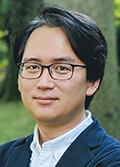 Penn’s Annenberg School for Communication doctoral candidate Soojong Kim has received a grant for $10,000 from the Waterhouse Family Institute (WFI) at Villanova University for a new study that investigates how polarized social networks and information flows affect the perceived credibility and virality of health misinformation. He hopes his study of misinformation on social media will pave the way for feasible and effective future interventions to curb the spread of health misinformation.
Penn’s Annenberg School for Communication doctoral candidate Soojong Kim has received a grant for $10,000 from the Waterhouse Family Institute (WFI) at Villanova University for a new study that investigates how polarized social networks and information flows affect the perceived credibility and virality of health misinformation. He hopes his study of misinformation on social media will pave the way for feasible and effective future interventions to curb the spread of health misinformation.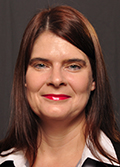 Lea Ann Matura, associate professor in Penn Nursing’s biobehavioral health sciences, is one of eight winners of Bayer’s inaugural Pulmonary Hypertension Accelerated Bayer (PHAB) Awards. Dr. Matura will study alternative treatments, such as Cognitive Behavioral Therapy and Bright Light Therapy, to improve symptoms of PAH, including insomnia, fatigue and physical activity levels.
Lea Ann Matura, associate professor in Penn Nursing’s biobehavioral health sciences, is one of eight winners of Bayer’s inaugural Pulmonary Hypertension Accelerated Bayer (PHAB) Awards. Dr. Matura will study alternative treatments, such as Cognitive Behavioral Therapy and Bright Light Therapy, to improve symptoms of PAH, including insomnia, fatigue and physical activity levels.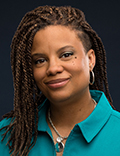 Robin Stevens, assistant professor in the department of family and community health at Penn Nursing, is this year’s recipient of the Early Career Award from the Public Health Education and Health Promotion Section of the American Public Health Association (APHA).
Robin Stevens, assistant professor in the department of family and community health at Penn Nursing, is this year’s recipient of the Early Career Award from the Public Health Education and Health Promotion Section of the American Public Health Association (APHA).
_resized.jpg)
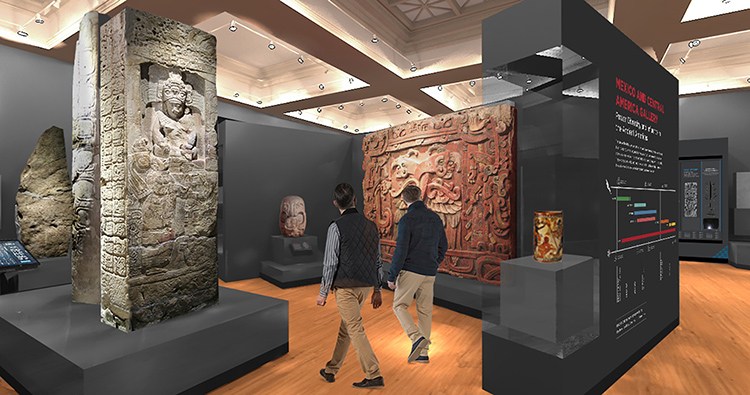
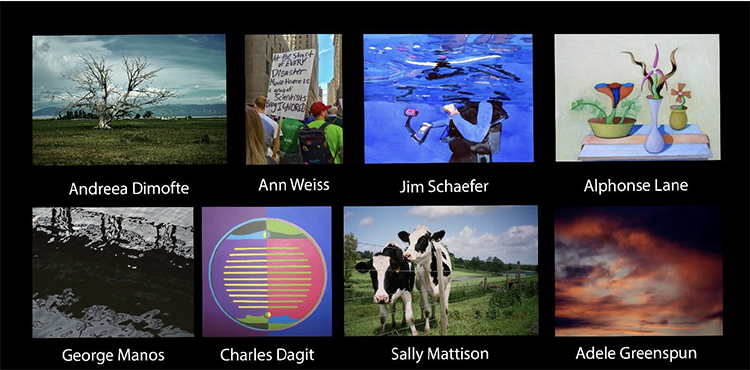
_resized.png)

